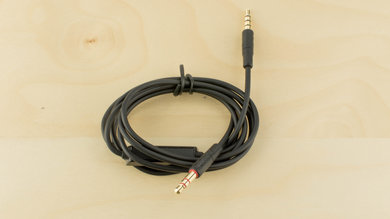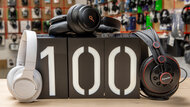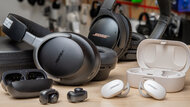The Skullcandy Crusher are mediocre critical listening headphones with a decently comfortable design. They have a unique bass enhancing a slider on the right ear cup that controls the amount of bass but it tends to make them sound quality a bit unbalanced and worse for more critical listeners. Unfortunately, they're also not the most durable headphones being mostly plastic and somewhat cheaply built.
Our Verdict
The Skullcandy Crusher are mediocre for mixed usage. They're comfortable and have a decent sound with an adjustable bass slider. Unfortunately, they won't be ideal for loud environments because they do not block a lot of noise. They also leak quite a bit at loud volumes which makes them less practical in some situations.
-
Adjustable bass response.
-
Comfortable and lightweight design.
-
Poor noise isolation.
-
Cheap build quality.
-
Leaky at moderate-to-high volumes.
Average for neutral listening. These headphones are not intended to deliver the most neutral sound. Their unusually springy design and bass slider make them geared towards a powerful low-end that if turned all the way up, sounds overly bass-heavy. This may be exactly what some fans of bass are looking for. However, in most situations, they will sound too uneven and poorly balanced for neutral listeners, except when the bass slider is at 0.
Not ideal for noisy commutes. They poorly isolate listeners in loud environments and will let a lot of ambient noise seep into your audio, especially on a lively bus or train ride.
Mediocre for sports. The Skullcandy Crusher headphones are too bulky and unstable for high-intensity exercises, like running. They also have a poor control scheme.
Mediocre-at-best for office use. Although they're decently comfortable headphones, the poor isolation will not block a lot of office chatter. They also leak a quite a bit at higher volumes and may distract your colleagues.
Average for gaming. The wired design of the Crushers means they have practically no latency when gaming. They also have a decently balanced sound, that thanks to the bass slider, makes some games sound more exciting. Unfortunately, they do not have many customisation options. They also make your ears a little warm when gaming for a while and they do not have the convenience of a wireless design.
- 5.8 Mixed Usage
- 6.2 Neutral Sound
- 5.5 Commute/Travel
- 5.9 Sports/Fitness
- 5.8 Office
- 5.0 Wireless Gaming
- 6.6 Wired Gaming
- 6.2 Phone Call
Changelog
- Updated Nov 21, 2019: Converted to Test Bench 1.3.1.
- Updated Nov 21, 2019: Converted to Test Bench 1.3.
- Updated Feb 16, 2018: Converted to Test Bench 1.2.
- Updated Sep 28, 2017: The microphone has been tested with our new methodology, as explained here
- Updated Aug 10, 2017: Converted to Test Bench 1.1.
Check Price
Compared To Other Headphones

The SkullCandy Crusher have a simple wired design with a unique bass slider that lets you control the amount of bass they deliver. They have a decently comfortable design with spacious ear cups but unfortunately, they feel somewhat cheap and not as durable as some of the headphones compared below. Their sound quality is also average at best and gets a bit too thumpy and muddy when turning the bass slider to the max settings. On the upside, that just might be what some fans of bass are looking for.
The Skullcandy Crusher Wireless 2016 are better headphones than the Skullcandy Crusher 2014 thanks to their wireless design you can also use wired. The wired Crusher 2014 have a more lightweight design and a better-balanced bass when not using the bass slider. They're also a bit more comfortable than the wireless variant since they're not as tight on the head. On the other hand, the Crusher Wireless have a better range, a more durable build quality, and easier to use controls, and they can be used wired and wireless which makes them a lot more versatile. They also have a better default sound.
The Skullcandy Venue Wireless are better than the Skullcandy Crusher 2014 in pretty much every way. They're wireless, are better built, have an active noise cancelling feature, have volume controls, and have better audio reproduction. They have 24 hours of playback thanks to a rechargeable battery, while the Crusher uses AA batteries. The only test where the Crusher 2014 performed better was their microphone performance, which isn't enough to make them an overall better choice over the Venue.
The Skullcandy Crusher 360 Wireless are noticeably better headphones than the regular wired Skullcandy Crusher 2014. Their sound quality is better, their wireless design offers more freedom to move, they're better built, and their control scheme is good and easy to use, with a unique haptic bass slider. They even offer the same amount of battery life than the wired Crusher, which need AA batteries. If you have the budget to afford the Crusher 360, they're better headphones in practically every category.
Test Results
The Skullcandy Crusher have a bland over-ear design that feels a little cheap. They're entirely made out of plastic with large square-ish ear cups and a wide headband. They're available in a variety of color schemes to suit your taste, from a military-camo green to a bright red option that will definitely stand out in a crowd.
The Skullcandy Crusher are decently comfortable headphones. They're fairly lightweight, and the earcups are well-padded and large enough to fit around most ears. Unfortunately, they're a bit tight on the head which does get fatiguing during long listening sessions, and the padding on the headband is not as comfortable as that of the earcups.
The Skullcandy Crusher have a mediocre control scheme with only one button to play, pause, and skip tracks. They have a mechanical slider that controls the level of bass but not volume. This is slightly disappointing considering that the one inline control button offered, also doesn't provide good tactile feedback.
The SkullCandy Crusher are not the most breathable headphones. They will make you sweat a bit more than average if you use them while working out and your ears will get warm after a couple of hours of critical listening. On the upside, they're a little better than other closed back over-ears thanks to the slightly perforated pads on the ear cups, but they won't be ideal for more intense exercises.
The Skullcandy Crusher have a mediocre-at-best build quality. They're entirely made out of plastic and they rattle when playing music, especially if you have the bass slider set all the way up. They do not feel as durable as headphones below their price range like the Bluedio T4. For better-built Skullcandy headphones, we suggest taking a look at the Crusher 360 Wireless or the regular Crusher Wireless.
These headphones are somewhat stable due to their high clamping force. Unfortunately, the large ear cups and bulky over-ear design is not ideal for more intense physical activities. They will barely stay on your head during a mild jog and will not be suitable for working out and exercising. On the upside, the cable will detach if it gets hooked on something so the headphones won't be yanked off.
The frequency response consistency is about average. These headphones show decent consistency in delivering bass across our five human subjects with the maximum deviation in the bass range being 3dB at 20Hz. In the treble range, the Skullcandy show below average consistency with a noticeable inconsistency around 6KHz, which is most likely due to their ear cup enclosure size and design.
The bass of the Crusher is excellent. Low-frequency extension is at 23Hz, which is great. Low-bass, which is responsible for low-end thump and rumble common to bass-heavy music is pretty balanced and within 0.2dB of our target. Additionally, mid-bass and high-bass are virtually flat, and over our target by less than 1.5dB. It should be noted that the Skullcandy Crusher was tested with their bass slider set to 0.
The Skullcandy Crusher have an average mid-range response. The response is relatively consistent and even, but shows a wide 6dB bump centered around 700Hz. This gives excess emphasis to the mid-range by pushing vocals/leads to the front, which makes mixes sound forward and boxy/honky.
The treble performance is sub-par. Low-treble is quite well reproduced and balanced, however, the 15dB dip in mid-treble centered around 6KHz will have a noticeable negative effect on the brightness and presence of vocals and lead instruments.
The imaging of the Crushers is great. Weighted group delay is at 0.18, which is very good. The GD graph also shows that their entire group delay response is almost entirely within the audibility threshold. This ensures a tight bass and a transparent treble reproduction. Additionally, the L/R drivers of our test unit were exceptionally well-matched. This is important for the accurate placement and localization of objects (voices, instruments, video game effects) in the stereo field.
The Skullcandy Crusher have a sub-par soundstage. The PRTF graph shows an inaccurate and unusual response, which suggest an unnatural and inside-the-head soundstage. The closed-back design of the headphones may also result in their soundstage to be perceived as less open than that of open-back headphones.
The isolation performance is sub-par. In the bass range, where the rumble of airplane and bus engines sits, they achieved no isolation. In the mid-range, important for blocking out speech, the reduce outside noise by about 5dB, which is inadequate. In the treble range, occupied by sharp sounds like S and Ts, the isolate by about 26dB, which is above-average.
The leakage performance of the Crusher is decent. The significant portion of the leakage is between 1KHz and 6KHz, which is not very broad and mostly concentrated in the treble range. This means that the leakage will sound quite thin. The overall level of the leakage is not loud either. With the music at 100dB SPL, the leakage at 1 foot away, averages at 39dB SPL and peaks at 50dB SPL, which is the same as the noise floor of an average offices.
The Skullcandy Crusher have an average in-line microphone. In quiet environments, speech recorded or transmitted with this mic sounds slightly thin and lacking brightness and airiness, but is still detailed and decently intelligible. In noisy environments, however, it struggles to fully separate speech from background noise in moderately loud places like a busy street.
The recording quality of Crusher's in-line mic is decent. The dip in high-bass and low-mid makes recorded-speech sound slightly thin. The roll-off in the treble range diminishes the brightness and airiness of recorded speech. However, the region between LFE and HFE is captured well, resulting in an intelligible and relatively detailed speech.
The in-line microphone of the Crusher is mediocre at noise handling. It achieved a speech-to-noise ratio of 16dB in our SpNR test, indicating that this mic will have difficulty separating speech from noise in moderately loud environments.
The Skullcandy Crusher have a long lasting AA cell that delivers up to 38 hours (average of 3 measurements) of continuous playback when the slider was set between 50 and 70 %. This means the battery life will be shorter if you set the slider to max bass setting and a lot longer if set to 0. However, sound quality does not deteriorate much once the battery runs out. Although you do lose all the enhanced bass effects the rest of the frequency response is not altered.
These headphones do not come with a customizable app.
These headphones are wired and do not have a Bluetooth connection. If you want a good Bluetooth headset for more casual use, check out the SkullCandy Grind.
These headphones have a simple wired connection with practically no latency. Unfortunately, this also means that they're limited by the range of the provided cables.
These headphones come with a non-os-specific audio cable with an in-line remote and microphone that is compatible with consoles. They will provide audio and voice chat support when connected to your PS4 or Xbox One controller, but you may need a headset adapter for PC if your PC does not have a 4 pin audio jack like tablets and phones.
These headphones do not have a dock. If you need a headset with a dock that also has a wired connection for gaming or watching movies, then consider the SteelSeries Arctis 7.
Comments
Skullcandy Crusher 2014: Main Discussion
Let us know why you want us to review the product here, or encourage others to vote for this product.




























































































